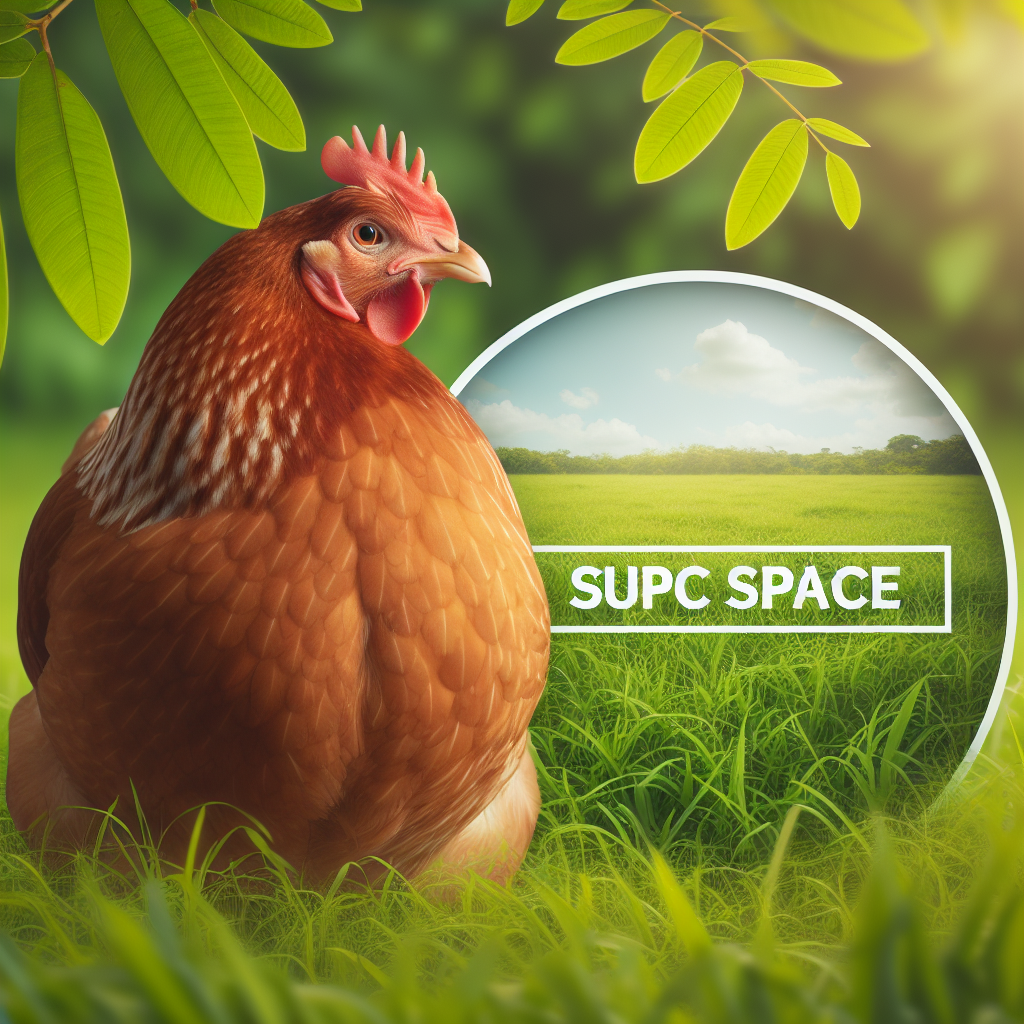Are your chickens feeling cramped? As a chicken owner, it’s important to understand the signs that indicate your flock may need more space. Whether they’re exhibiting restlessness, feather picking, or aggressive behavior, these are all red flags that your feathery friends are craving some extra room. In this article, we will explore the telltale signs that your chickens need more space, ensuring your beloved birds are happy and healthy. So, put on your farming hat and let’s dive into the world of chicken behavior to decipher the signals that your flock is sending you.
Signs of Aggression
Pecking
One of the signs that your chickens may need more space is increased aggression, particularly pecking behaviors. If you notice that the chickens are constantly pecking at each other, pulling out feathers, or causing visible injuries, it could be a clear indication that there is not enough room for them to establish their social hierarchy in a healthy manner.
Frequent fights
Frequent fights among your chickens can also be a sign that they are feeling cramped and stressed due to lack of space. If you regularly witness aggressive behaviors such as chasing, sparring, or even full-blown fights, it is important to consider providing your chickens with a larger living area to alleviate the tension and create a more harmonious environment.
Feather picking
Feather picking is another aggressive behavior that can arise when chickens are overcrowded. This occurs when one chicken continuously plucks the feathers of another, often leading to bald patches and skin injuries. It is essential to address this issue promptly by providing more space for the chickens to roam freely, reducing stress and minimizing the chances of feather picking.
Overcrowding Symptoms
Increased stress levels
One of the telltale signs of overcrowding in chickens is an increase in stress levels. Chickens are social animals but also require personal space to feel secure and at ease. When chickens don’t have enough room to move around, stretch their wings, or establish individual territories, it can lead to heightened stress levels, resulting in a range of negative physical and behavioral changes.
Reduced egg production
If you notice a significant decline in egg production from your chickens, overcrowding could be a potential underlying cause. Overcrowding can disrupt the chickens’ reproductive cycle, causing them to feel unsettled and less likely to lay eggs. Providing them with more space can help alleviate this stress and encourage healthier egg production.
Unhealthy appearance
Overcrowding can take a toll on chickens’ overall health and appearance. When chickens are confined to a small area for an extended period, they may appear lethargic, have dull feathers, or exhibit signs of weight loss. Additionally, overcrowded chickens may have a higher susceptibility to diseases, making it crucial to address the space issue promptly to maintain their well-being.
Feeding and Drinking Behaviors
Food refusal
When chickens don’t have enough space to eat comfortably, they may exhibit food refusal behavior. This can happen when the feeding area becomes overcrowded, making it difficult for each chicken to access food and water freely. If you observe chickens backing away from the feeding area or spending less time eating, it’s likely a strong indicator that they need more space.
Increased water consumption
Overcrowded chickens may also increase their water consumption. This can be a result of increased stress, as well as an attempt to compensate for the lack of space by staying hydrated. By providing your chickens with more roaming area and ample access to fresh water, you can help regulate their drinking habits and ensure their overall well-being.
Reduced foraging
Chickens naturally enjoy foraging and exploring their surroundings to find food, insects, and other enriching elements in their environment. If you notice a decrease in your chickens’ foraging behavior or lack of interest in their surroundings, it could indicate that overcrowding is limiting their natural instincts and desire to explore. More space would allow them to engage in this natural behavior, keeping them active and mentally stimulated.
Droppings and Odor Changes
Excessive feces buildup
Overcrowding often leads to excessive feces buildup in a confined area, creating an unsanitary and potentially harmful environment for your chickens. If you find that the coop or pen is constantly covered in thick layers of droppings, it is a clear sign that they need more space. Increasing the living area can reduce the concentration of droppings, improving hygiene and overall health.
Strong ammonia smell
A strong ammonia smell emanating from the coop is another indication of overcrowding. Ammonia is released from the breakdown of chicken droppings and can accumulate rapidly in a confined space. High levels of ammonia can irritate the chickens’ respiratory system, leading to respiratory issues and other health problems. By providing more space, you can improve ventilation and minimize the buildup of ammonia, promoting better air quality.
Unusual color or consistency
Keep an eye out for changes in the color or consistency of your chickens’ droppings. Overcrowding can result in more frequent exposure to unhealthy bacteria, leading to digestive issues and changes in droppings. If you notice abnormal colors, such as red, black, or green, or if the consistency becomes watery or unusually solid, it may be an indication that your chickens are stressed and in need of more space.
Abnormal Behavior Patterns
Repetitive pacing
When chickens are confined in a small space, they may exhibit abnormal behavior patterns, such as repetitive pacing. If you observe your chickens incessantly pacing back and forth in their coop or pen, it is an indication that they are experiencing restlessness and frustration due to limited space. Providing larger roaming areas can help alleviate this behavior and promote a more natural and contented environment.
Excessive flapping
Flapping is a natural behavior for chickens, allowing them to exercise their wings and maintain their physical health. Overcrowded chickens often have limited space to flap their wings freely, resulting in excessive flapping as a way to release pent-up energy. If you notice your chickens flapping more frequently than usual, it could indicate that they need more space to engage in this natural behavior.
Abnormal vocalizations
Overcrowded chickens may exhibit abnormal vocalizations as a response to stress and frustration. If you notice an increase in alarm calls, distressed vocalizations, or abnormal clucking patterns, it is likely due to the chickens feeling overwhelmed by their confined living space. Creating a more spacious environment can help reduce these abnormal vocalizations and create a calmer atmosphere for your chickens.
Feather Loss
Bald patches
Overcrowded chickens are prone to developing bald patches due to feather loss caused by excessive pecking or feather picking behaviors. If you observe chickens with visible bald spots on their bodies, it is a clear sign that they need more space. Providing more roaming area can help alleviate social tension and reduce the occurrence of feather loss among your flock.
Feather damage
Feather damage is another common issue in overcrowded chicken environments. Due to cramped conditions, feathers may become damaged or frayed as a result of constant rubbing against walls, fences, or other chickens. Healthy feathers are crucial for temperature regulation, protection, and overall well-being, so ensuring enough space for your chickens to move around freely is essential to prevent feather damage.
Molting issues
Overcrowding can disrupt the natural molting process of chickens. Molting is a necessary shedding and regrowth cycle for feathers, allowing chickens to maintain optimal insulation and stay healthy. However, overcrowded conditions can delay or interrupt this natural cycle, leading to irregular molting patterns or even prolonged molting. Providing sufficient space for your chickens to molt comfortably is vital for their overall feather health and well-being.
Lack of Roaming Space
Limited exploration
Chickens naturally possess a strong instinct to explore their surroundings. However, overcrowded conditions can restrict their ability to engage in this innate behavior. If you observe a lack of exploration or notice that your chickens are sticking to a confined area, it may be a sign that they are in need of more roaming space. Allowing them access to larger areas will encourage them to explore, forage, and engage in their natural behaviors.
Frequent huddling
Overcrowded chickens often resort to frequent huddling as a way to seek comfort and security. Huddling behavior can occur when the chickens do not have enough space to establish their individual territories or create personal spaces. If you consistently observe your chickens clustering together, piling on top of one another, or seeking warmth in crowded corners, it is an indication that they need more roaming space to feel comfortable and secure.
Difficulty stretching wings
Chickens require ample space to stretch their wings fully and maintain their physical health. Overcrowded conditions can limit their ability to stretch and flap their wings freely, leading to muscle stiffness and decreased mobility. If you notice your chickens struggling to stretch their wings, experiencing limited range of motion, or exhibiting signs of discomfort when attempting to do so, it is a clear indication that they require more space to maintain their well-being.
Nest Box Troubles
Egg laying in communal areas
If your chickens are laying eggs outside of designated nest boxes and in communal areas, it can be an indication of overcrowding. Chickens need privacy and a sense of security when laying eggs, and overcrowding can disrupt this natural behavior. Providing enough nest boxes for your flock, in addition to more space, will help encourage them to lay eggs in appropriate areas and reduce the risk of egg breakage or contamination.
Increased egg breakage
Overcrowded chickens may experience an increased rate of egg breakage. In cramped conditions, chickens may inadvertently step on or knock over eggs due to limited space for movement. Additionally, stress levels caused by overcrowding can lead to thinner eggshells, making them more prone to breakage. By providing more space and reducing stress, you can decrease the occurrence of egg breakage and ensure healthier eggs from your flock.
Lack of preferred nest box usage
Another indication of overcrowding is when chickens refuse to use available nest boxes and instead lay eggs in communal areas or even on the ground. This behavior can arise due to a lack of personal space or competition for limited nesting spots. If you notice that your chickens are not utilizing the provided nest boxes and are opting for alternative locations, it is crucial to address the space issue and provide more suitable options to promote proper nesting behavior.
Increased Frequency of Illness
Higher susceptibility to diseases
When chickens are overcrowded, their immune systems can become compromised, leading to a higher susceptibility to diseases. Overcrowding increases the chances of pathogen transmission and stress levels among chickens, making them more vulnerable to various illnesses. By providing more space and reducing density, you can decrease the risk of disease transmission and improve the overall health of your flock.
More frequent infections
Overcrowding can create an environment conducive to the spread of infections. Chickens in close proximity are more likely to come into contact with pathogens and parasites, increasing the likelihood of infections. If you notice a higher frequency of infections among your chickens, it is essential to consider providing them with more space to minimize contact and reduce the risk of infections spreading.
Slower recovery rates
Overcrowded chickens may experience slower recovery rates from illnesses or injuries. When space is limited, chickens are more susceptible to stress and secondary infections, hindering their ability to heal effectively. Providing ample space allows chickens to isolate themselves when necessary, reducing stress levels and promoting faster recovery rates.
Elevated Noise Levels
Loud distress calls
Overcrowding can contribute to increased noise levels in your chicken coop or pen. Chickens may resort to loud distress calls when they feel overwhelmed, threatened, or confined. If you hear excessively loud distress calls from your chickens, it indicates that they are under stress and in need of more space to alleviate the tension and create a more peaceful environment.
Excessive squawking
Overcrowded chickens often engage in excessive squawking as a result of frustration or territorial disputes. Squawking is their way of communicating and asserting dominance, but when space is limited, this behavior can escalate into constant noise and disturbance. By providing your chickens with more space, you can minimize excessive squawking and create a more serene atmosphere for both your flock and neighboring areas.
Increased alarm vocalizations
Chickens in overcrowded environments may also exhibit heightened alarm vocalizations. They become more alert and reactive due to the confined space, perceiving potential threats more readily than necessary. If you notice an increase in alarm vocalizations and heightened sensitivity to their surroundings, it is likely due to the lack of space. Enlarging their living area can help reduce the frequency and intensity of these alarm vocalizations, allowing your chickens to feel more secure and peaceful.
In conclusion, signs that your chickens need more space are evident through various behavioral, physical, and environmental changes. By observing their interactions, feeding and drinking behaviors, droppings and odor changes, abnormal behavior patterns, feather loss, lack of roaming space, nest box troubles, increased frequency of illness, and elevated noise levels, you can determine if your chickens are experiencing overcrowding. Providing sufficient space for your flock to roam, explore, and establish personal territories is essential to maintaining their physical and mental well-being.




